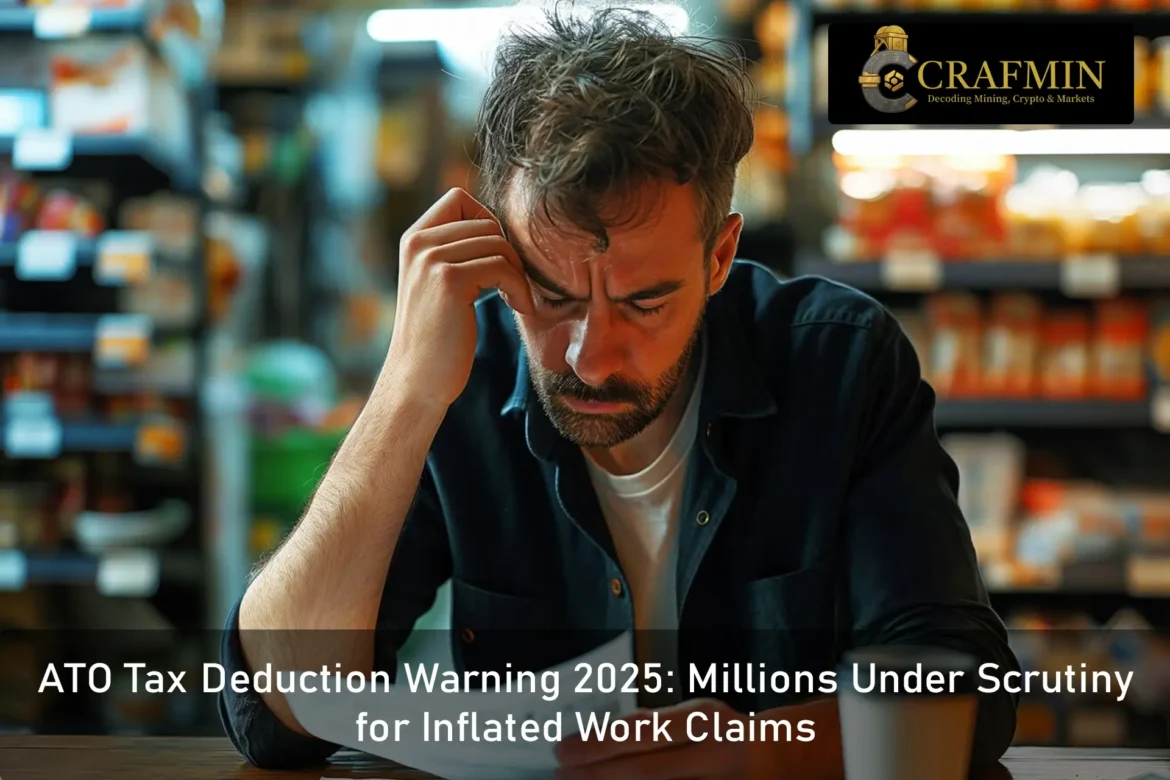With tax season in full swing, the Australian Taxation Office (ATO) has issued a firm warning to millions of workers filing their returns—scrutinise your deductions or risk an audit. The ATO tax deduction warning 2025 zeroes in on overclaimed car expenses, work-related self-education, and private use masquerading as business costs.
From drivers to desk workers, taxpayers are being reminded that just because a claim is common doesn’t mean it’s correct. As the ATO sharpens its review tools, experts are urging Australians to rethink the assumption that minor work-related purchases automatically qualify for a refund.

Insert Image 1: Taxpayer reviewing receipts and a logbook with calculator during EOFY
Source: Officeworks
Car Expense Claims in the Crosshairs
Leading the crackdown is a renewed focus on car expense claims, particularly those filed using the cents per kilometre rate. The ATO flagged this area due to a pattern of inflated and unsubstantiated submissions in recent years.
In 2025, many individuals are still claiming the 5,000-kilometre threshold using the flat rate without maintaining adequate documentation.
“Too many Australians assume the cents-per-kilometre method is a safe bet. It’s not. You need a justifiable work-related pattern to back up that figure,” a senior ATO compliance officer warned this week.
The logbook method remains the preferred approach for those with significant car use, but it comes with expectations—accurate, 12-week logs of all trips, clearly distinguishing between private and business use.
Self-Education Expenses: What Counts and What Doesn’t
The ATO is also turning its attention to self-education tax claims, which spiked in recent years due to online learning and remote work transitions. However, not all courses qualify.
If a training program or subscription doesn’t directly relate to a person’s current job or income-producing role, it’s not deductible—even if it’s vaguely “career boosting.”
For instance:
- Deductible: A marketing professional upgrading skills with a paid digital campaign course.
- Not deductible: A hospitality worker enrolling in a personal finance course or yoga teacher training.
“We’re seeing people try to claim professional development expenses for career shifts or hobbies,” the ATO said. “That’s not how the law works.”

Image 2: Person at a desk reviewing self-education receipts and course fees
Source: istock
Private Expenses Masquerading as Business Claims
Another key focus of the ATO tax deduction warning 2025 is the blending of private and professional expenses. Items such as mobile phones, internet plans, home office setups, and even clothing are often misrepresented in tax returns.
According to the ATO:
- Work-from-home deductions must reflect actual work-related use.
- Phone and internet claims require itemised records, not estimates.
- Everyday clothing is rarely deductible unless it’s industry-specific or protective.
Blurring personal use with business claims remains one of the most common errors flagged during post-lodgement reviews.
Tech-Backed Compliance: Smarter Audits Are Here
The ATO is deploying enhanced data-matching tools and AI-powered analytics to sift through millions of returns. These systems compare deductions across industries, roles, and regions to flag inconsistencies.
An unusual spike in car claims for an office-based employee, or a high self-education spend for someone working part-time, now prompts automated checks—and often follow-up requests for receipts or logs.
“Our systems don’t just rely on dollar figures anymore. They assess patterns, trends, and mismatches based on your occupation and income bracket,” said an ATO spokesperson.

Image 3: Visualisation of ATO data tools scanning electronic tax records
Source: Australian National Audit Office (ANAO)
Tips to Stay Compliant in 2025
To stay on the right side of the ATO this tax season, Australians are advised to:
- Keep accurate records: Maintain receipts, logbooks, and clear notes on work use vs personal use.
- Use reputable tax agents: They can provide clarity on what’s claimable and how to stay compliant.
- Double-check deduction criteria: Use the ATO’s online tools or consult a professional.
- Avoid guesswork: Estimating kilometres or rounding up costs without evidence is risky.
- Don’t copy past claims: Circumstances change, and so do the rules.
Conclusion: A Reminder That Deductions Aren’t a Free-for-All
The ATO tax deduction warning 2025 is a signal that the era of “set and forget” claims is over. As the tax office adopts smarter enforcement strategies, taxpayers will need to match that vigilance with honest, well-documented claims.
Trying to squeeze an extra refund by inflating deductions may seem tempting, but the cost of being audited—or penalised—is far steeper.

